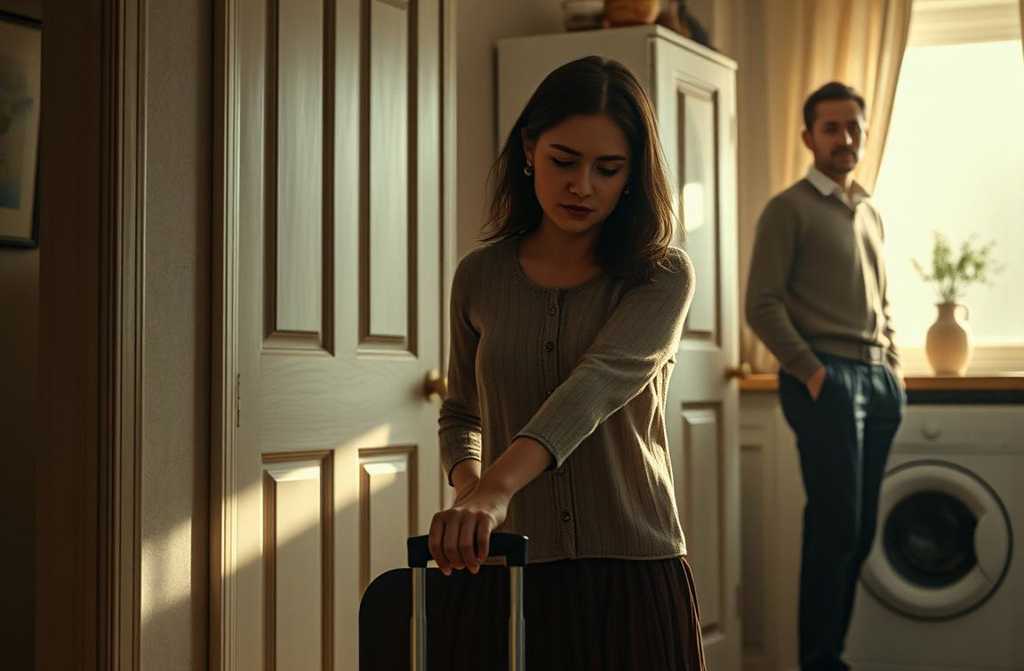That morning, her suitcase was waiting in the hallway.
“Claire…” John began.
“Dont,” she cut him off. “You made your choice. Now Im making mine.”
The door slammed. John was left alone.
He sat at the kitchen table, poking listlessly at his cold shepherds pie with a fork. Half past six. Claire was already an hour and a half late.
The telly in the corner murmured about another political scandal, but John wasnt listening. His gaze drifted over familiar thingsthe yellow daisy-patterned curtains Claire had hung five years ago, his worn slippers by the fridge, her knitted cardigan draped over a chair. Everything was in its place. Except for her.
The front door clicked open. Finally.
“John, Im so sorry!” Her voice was exhausted. “Dad wasnt wellwe had to call an ambulance.”
John winced. Those old folks again.
Claire stumbled into the kitchenflushed, her hair a mess, eyes red from crying.
“What happened?” he asked, not looking up from his plate.
“His blood pressure spiked. The doctor said he needs constant monitoring…” She slumped into the chair across from him. “Mum panickedshe didnt know what to do.”
“They dont have a phone? Cant call 999 themselves?”
Claire flinched as if hed struck her.
“John, theyre in their seventies. They were scared. And theyre my family.”
“And Im not?” He tossed his fork aside and glared at her. “I come home to an empty house, cold dinner. Youre never here anymore.”
“Im sorry,” she whispered, reaching for the stove. “Ill heat it up.”
But the bitterness was already simmering inside him. She used to greet him at the doorhand him his slippers, ask about his day. Now it was always her parents.
Claire moved silently around the kitchen, shoulders slumped, hands trembling as she rearranged pans. John watched the back of her head and remembered how she used to turn to him with a smile.
When was that? A month ago? Two?
“Listen,” he said, forcing his voice softer, “maybe they need a carer. Their pensions arent bad.”
Claire froze, ladle in hand.
“Not bad? John, Dad gets £800 a month, Mum gets £600. Half of that goes to meds and bills.”
“£600? She worked her whole life!”
“As a teacher in a village school,” Claire turned to him. “You know this.”
He didnt. Never bothered with her parents’ finances. His own had passed a decade ago, leaving a one-bed flat hed sold straight away. Claires folks? He only saw them at Christmas.
“Then hire help by the hour,” he suggested. “Cleaning, cooking.”
“With what money?” Her voice sharpened. “Did you even hear me? £1,400 between them!”
John shrugged. Hed never thought about other peoples budgets. He and Claire had enoughhis engineering salary, her private tutoring. Comfortable, no excess, but no struggle either.
Outside, the sky darkened. Claire set a reheated plate in front of him and sat down. She didnt eatjust propped her chin on her hand, staring at the table.
“Claire,” he said. “I dont mind helping. But you cant abandon our home.”
“Abandon?” Her eyes lifted, wet and furious. “Is this even a home anymore? Are we even a family?”
The question hung between them.
John chewed slowly, thinking. A family? Suppose so. No kidsClaire couldnt have them, and adoption never felt right. Just the two of them, quiet and steady.
“Of course we are,” he finally said.
The next weeks were tense. Claire was at her parents every other daydoctor visits, meds, cleaning. John came home to an empty flat. Dishes piled up, the bed unmade, leftovers in the fridge.
“I cant do this anymore,” he snapped one evening. “The house is falling apart.”
“Whats fallen apart?” Claire sighed, dropping a bag of laundry. “Forgotten how to cook? Wash up?”
“Its not about chores.”
“Then what?”
John faltered. It wasnt the mess. It was the shifther attention, once fixed on him, now wholly elsewhere.
“Theyre not children,” he tried. “They managed before.”
“Mum fell in the bath yesterday. Lay there for two hours till I arrived.” She flung the bag down. “What, should I just leave them?”
“Hire a carer!”
“With what money?” she shouted. “With what?”
They stood in the kitchen, yelling for the first time in fifteen years. Claire cried, tears streaking her face. Johns stomach twisted.
“John, do you hear yourself?” Her voice shook with anger. “Theyre my parents! My father! My mother!”
“And what am I?” he exploded. “A lodger? A flatmate?”
“Youre my husband! But they”
“But they come first!” he cut in. “Fifteen years, everything was fine, and now suddenly you remember filial duty?”
Claire recoiled as if struck.
“How can you say that? Theyre old, theyre ill”
“And Im what, thirty? Im tired too! I want my wife home, not God knows where!”
“So I should abandon them? Let them die alone?”
“I didnt say die! But they can manage! They have savingshire help!”
“What savings?” she cried. “A carer costs £20 an hour! Minimum!”
John faltered. Hed never priced carers.
“Well… maybe not daily. An hour a day”
“An hour?” Claire laughed, hysterical. “Clean, cook, wash, shopin an hour? Be serious!”
“I cant take this!” John slammed his fist on the table. “Watching you leave every day! Youre never here!”
The words spilled outraw, unplanned. And he knew: it wasnt chores or cold dinners. It was fear. Fear of losing her. Fear of being alone.
Claire stared, wide-eyed.
“So its not about money. Youre jealous. Of my own parents.”
“Im not!” he snappedthough she was right. “I just… I want my wife back, not a full-time carer!”
“And if your parents were alive?” she asked. “Would you abandon them?”
John opened his mouth. Shut it.
His parents… If theyd lived this long, maybe hed help. Maybe. But this was different.
“My parents are gone” he began.
“And mine arent!” she shot back.
“Right,” he said coldly. “No more visits. If you want to help, £100 a month. Max. Thats enough for a few carer visits.”
“What?”
“No more trips. No more money. Thats final.”
Claire stood theresmall, dishevelled, tear-streakedstaring at him like he was a stranger.
“Youre forbidding me,” she said slowly. “A forty-year-old woman. Forbidding me to help my dying parents.”
“Claire”
“£100 a month,” she continued, voice brittle. “Five carer visits. One hour each. Five hours of help a month. The rest of the time, they can starve? Live in filth?”
She wiped her face, looked at him long and hard, then walked out.
That morning, her suitcase was in the hallway.
“Claire” John started.
“Dont,” she said. “You made your choice. Now Im making mine.”
The door slammed.
The first days felt oddly freeing. No nagging about socks. Football late, eating straight from pans. Freedom.
But by weeks end, he cracked. Hired a cleanerLinda, fortyish, twice a week. £300 a month.
“Wheres your wife?” she asked once.
“Split up,” John said shortly.
Linda tutted sympathetically and scrubbed the sink.
News of Claire came in scraps. A neighbour saw her at the GPs with an old manher dad. A colleague spotted her at the theatre with some bookish bloke. Then divorce papers arrived.
The neighbour broke the next update with glee:
“Your Claires remarried. Some doctor. Widower, kids and all.”
John nodded, shut the door, stared at the ceiling. So shed found a new family. Kids too. Wonder how she managed?
Years slipped by. Linda kept coming. John worked, watched telly, saw mates occasionally. Life settled.
Then he turned sixty. Work grew hardbad back, dodgy blood pressure. He retired.
The pension was less than expected£800 a month. With bills at £300, little was left.
First cut: the cleaner.
Alone at sixty, he relearned laundry, cooking. His hands fumbled, his back ached. What Claire did effortlessly now took half his day.
After six months, he cracked. Picked up the phone.
“Hello?” Her voice was unfamiliar.
“Claire… Its John.”
A pause.
“What do you want?”
“To talk.”
Words stuck. He fidgeted, gripping the receiver.
“I… I was wrong. Im sorry.”
“And?”
“I want to fix this.”
Claire laughed.
“Fix it? John, its been ten years. Ten!”
“I know, but”
“Some things cant be undone,” she said. “Understanding comes too late sometimes.”
The line went dead.
That evening, he sat at the same kitchen table. The yellow curtains were faded, Claires cardigan long gone. Only his battered slippers remained by the fridge.
Outside, streetlights flickered on. Neighbours windows glowedfamilies inside, someone waiting for someone.
And he was alone.







